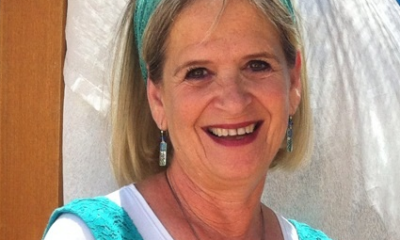
OpEds

Ackerman case shows peril of predators for children
Published
1 year agoon
By
Rozanne SackThe case of Gerhard Ackerman, who faces 740 charges ranging from rape, attempted murder, distribution of child pornography, and human trafficking of minor children for sexual exploitation may not seem relevant to our community, but it most certainly is.
Ackerman is alleged to have worked in a sex ring with his co-accused, renowned human rights lawyer and acting judge Paul Kennedy. Ackerman is alleged to run a child sex ring in Johannesburg, where he would lure teenage boys online and link them with adult men who would require massages that would escalate to rape. Kennedy took his life in February last year.
This case has rocked South Africa, and compares closely to the Jeffrey Epstein case in America.
According to Sarah Hoffman from Klikd, 70% of our children will be involved in requesting, sending, or seeing a “sext” or nude. Sexting refers to the sharing of nude or semi-nude and sexually provocative photos via mobile phones as well as on other social media platforms.
Teens today live their lives largely on social media. One of the reasons sexting may be so prevalent in this age group is their need to form attachments. They are easily convinced that in exchange for their pictures, they will receive adoration and affirmation, connection, and perhaps a long-term relationship. The requesting and sending of sexts is done equally by boys and girls. There may come a point at which the teen begins to feel uncomfortable and unsafe and tries to extricate themself from the relationship. This is when the threats may start. The other party will often threaten to expose the nude pictures to the child’s entire list of social media contacts. This fear of exposure can hook them into sending more and more.
The danger with this new currency of interacting is that it easily opens the way for predators to gain access to children. Online predators will use the same grooming tactics as any abuser to gain trust and forge a bond with the child. They will have a fake profile picture, fake age, fake shared hobbies, and often adopt a persona that’s just a bit older than the victim with the promise of a special and unique friendship. In a society where most teens feel inadequate about their bodies and image, it’s easy to fall into the web of flattery and agree to these intimate exchanges.
According to OffenderWatch.com, there are an estimated 500 000 online predators active each day. Children aged between 12 and 15 are particularly susceptible to being groomed by a predator they have met online. Even more alarming is that these children may eventually agree to meeting this “new friend” in person.
Koleinu SA has been involved in various cases in which Jewish children have become the victim of online predators, sextortion, or revenge porn. Sextortion is a serious crime which occurs when someone threatens to distribute sensitive material of a private nature if the victim doesn’t adhere to their demands for images of a sexual nature, sexual favours, or money. Revenge porn involves the distribution or sharing of any nude or sexually explicit material of someone without their consent or permission for the express purpose of humiliating them or getting back at them for a break up.
In the Ackerman case, the father of one of the victims told the high court that his son met Ackerman via Facebook, where he allegedly offered him an opportunity to become a masseuse. He initially refused to let his son leave the Free State to meet the accused in Johannesburg, who was a complete stranger. However, he eventually spoke to Ackerman on the phone, who explained the business to him and assured him that he was trying to help his son become independent, even going so far as assuring him that it was a legitimate business with no “funny business” like sexual contact. He then allowed his son to meet him, after which he was forced to perform sexual acts on clients.
So, what can parents do to equip their children with the skills to respond to requests for sexts, which have the potential to land them in a situation of either threat, intimidation, sextortion, or even worse, meeting a predator face to face.
According to Klikd’s mini e-book available online titled The Ultimate Parents Guide to Teens and Sexting, parents can teach their children how to deflect a request by using a strategy called “the alternative no”. This technique uses diversion and humour, and examples of quick come backs can be found in the e-book. Its aim is to help teens hold onto their cool status without losing face. As we teach children in our SchoolSafe prevention of child-abuse programme to always tell a trusted adult if they find themselves in a situation that they cannot manage, so too should parents help their teen identify who their trusted adults are. They can also teach their teen that if the other person doesn’t accept “no” and the harassment persists, they need to give a stronger “no”, block the person, take screenshots, and tell a trusted adult.
Social media lawyer Emma Sadleir describes online content as having a tattoo effect. What you put out there stays out, and can surface years later. She reiterates the warning that digital content is dangerous, and can have devastating consequences down the line for the teen in terms of university or job applications.
The average age of first exposure to pornography is 11, Sadleir says, and she’s finding 10 to 14 year olds to be the most problematic age groups with regard to cyberbullying. Sadleir says children from the age of 14 have full criminal capacity and can be jailed for these online sexual offences. From the age of 12, children can be held liable and an assessment of their criminal capacity would be made.
The new Cyber Crimes Act of 2021 criminalises online behaviour such as harassment and sextortion. For children under the age of 18, sexting is a criminal offence under the Act. A child who receives a sext and keeps it on their phone can be held criminally liable from the age of 14 for possession of child pornography. A child who distributes that photo to just one other person is criminally liable for distribution of child pornography. If a child older than 14 could have done something to stop the sharing and didn’t, they are legally liable. Any admin of a WhatsApp group now has the ability – and thus the responsibility – to delete any offensive posts for the whole group, and has to report it.
This is scary territory, but the best prevention is having an open line of communication with your teen. Let them know that nothing is ever too terrible for them to tell you, and you will always be there for them. Keep in mind that the time for consequences is always later.
Koleinu SA works closely with Klikd on cases, as well as with social media lawyer Emma Sadleir, child development specialist Luke Lamprecht, as well as psychologists specialising in this field. Reach out if you need help.
- Rozanne Sack is the co-founder and director of Koleinu SA, the helpline for victims of abuse in the South African Jewish community. The helpline number is 011 264 0341, operating on Sunday to Thursday from 09:00 to 22:00 and after Shabbat until midnight.










